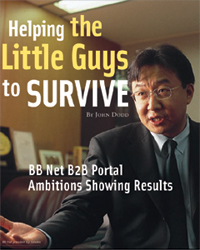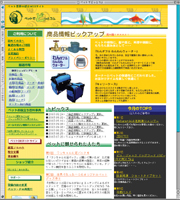Helping the Little Guys Survive
Back to Contents of Issue: November 2003
|
|
|
|
by John Dodd |
|
|
The trend of small owners being displaced from the market really started speeding up with the change in the large stores establishment law. As a business consultant in the confectionary and bakery industries, Eiji Tanaka realized that the writing was on the wall and small store holders were destined for extinction if they didn't get help fast. He correctly identified that unified buying of ingredients would be a key competitive element in helping the small store holders to fight back. So in 2000 he founded the Brisk Business Network.
Describe your business
Our business is to assist industries servicing small companies needing to buy products and services. At the moment we are particularly focused on servicing the multitude of small confectionary and bakery stores in Japan, which represent an industry turnover of around JPY1.5 trillion every year. Restaurants are another major source of business, and that industry represents an even bigger opportunity of about JPY25 trillion every year. Ramen and Chinese restaurants are an important target for us. The purpose of our business is to use our IT expertise to help these businesses work efficiently by aggregating their buying and using the Internet as a tool to get the work done.
We started managing the wholesaling of ingredients over the Internet because this sector is so inefficient. You see, the way that Japanese food distribution works, every single ingredient involves a large number of middlemen. The bigger the brand name, the bigger the food chain of middlemen is. For example, if you take a well-known company such as Nissin, you will find that as a major brand, their operations involve an inordinate number of wholesalers and middlemen. Their procurement plans are based around relationships with these suppliers, but they have to establish a different set of procedures and relationships for each and every ingredient.
Well, personally and perhaps somewhat surprisingly, I studied mechanical engineering in college. I went on to get a job as an engineer at Daihatsu. Soon after I changed jobs and went to the Funai Research Institute. There I gained expertise in the confectionary and bakery industries as a consultant, and eventually I elected to become an independent consultant. That was when I realized how much the Internet could do for the industry, so I set up BBNet to provide all the services, which, as a consultant, I was having to advise on.
How did you get started?
It is always difficult to form a strategy to develop business partnerships, especially in Japan, and we soon learned that the only way to do it was to approach each one on a company-by-company basis. It really is the only viable means of achieving the kind of partnerships we needed.
I started at Funai Research institute -- a consultancy company listed on the second section of the Osaka Stock Exchange. I was a consultant at this company and was a specialist in the confectionary and bakery industries. That is where I gained my expertise and where the idea for BB Net sprang from.
The Internet is a tool that allows one to put all the parts of an industry together in the same place. Take the confectionary and bakery industries as a prime example: There are so many parts to it and so many services that surround it. There are ingredients, delivery services, all the aspects of running a store, wholesalers, insurance and a massive range of other services that form this one industry. Our company goal is to develop services that aggregate all these stores together so that they can act as a single massively large customer. With this kind of buying power and centralized information resource, the industry can run more efficiently. Now that we've gained this primary expertise, we are starting to create alliances with other service providers. We'll keep the confectionary and bakery business in-house, and eventually form an IT-based infrastructure for each separate industry.
When I look at IT usage, I look at the fact that there is no confectionary store or bakery that doesn't have a phone. I have no doubt at all that the Internet will become an equally indispensable tool and penetrate these businesses in exactly the same way. This usage of the Internet is not an issue of our having more high-tech expertise than someone else. Rather, the real key here is about working out how the Internet can be used simply and effectively so that the average store owner can make their business work better.
How about Osaka?
Although I don't like to say it, I admit that it is a bit of a problem being in Osaka, and there are some disadvantages. The first problem is that the real market volume for the industries we are focused on is really in Tokyo -- because Tokyo is where the greatest concentration of confectionary stores and bakeries are. Another problem has been persuading investors that it is possible to effectively run this sort of business from Osaka, and also getting them to understand our company. A lot of investors are based in Tokyo, and it takes a lot of persuading to get them to come down and properly look at the company and what we are trying to do.
We have 70 people working at the parent company, of whom around half are currently on secondment to industry players whom we work with. We also have a 100 percent subsidiary dealing with the restaurant industry, which has 40 regular employees and around 200 part-time workers. Lastly, we have six people working in another subsidiary. How do you leverage the Internet into an old fashioned industry such as food?
I think it is best to think of the Internet as just a type of media. It makes things efficient, but its presence should not fundamentally cause a company to change its business. The most interesting thing to watch has been the speed of penetration. From our point of view, this makes timing the absolute prime concern. It has taken longer than we originally thought for the concept of the Internet to reach into the industries we are working with, but this year we have really seen things starting to take off.
How is business going?
The business is profitable. The margins are good because we have chosen to deal with small and medium-sized businesses. It is difficult to get in with the very large corporations, but you have to remember what a massive proportion of an economy is made up by small and medium-sized companies. Our aim is to target more and more of these because that is where the Japanese recovery is going to start from.
One other thing we have been looking into is mobile phones because of all the emerging Internet services available through the cellphone. Although cellphone screens are far too small to be useful to us at the moment, eventually we see them becoming a serious business tool. I think it will happen soon.
The changes since then have certainly been significant. When the IT bubble burst and stocks fell so sharply, people turned very negative on the Internet. It continued to attract this negative perception right up until the end of 2002. I think that 2003 has been kind of a crunch year -- people have finally climbed out of the negative mindset and have started to realize how much benefit there is to be gained from the Internet. It was really important for companies like BBNet that the public and the investors have gone through that process of changing attitudes. Until March 2000, people thought that e-commerce was the answer to absolutely everything. Eventually they realized that this was not the case. Now the business world has made a far more important conclusion -- that the Internet is a tool that can be used to improve all sorts of industries.
What BBNet recognizes is that Japan is a great market with a lot of consumers and a place where tastes change very quickly. The Internet is not going to change the structure of businesses, but it is going to equip Japanese businesses to cope with the very high speed with which consumer tastes change. In order to maximize profits from trends, businesses need to be able to quickly access the sort of information and networks that will provide the information and tools to meet customer demands.
Is this business model expandable?
There are lots of businesses that serve part of an industry -- services like insurance or delivery or wholesale -- but there is really no single business that serves the whole of an industry. What we are doing using the Internet to tie all those individual services together in an effort to form a single service hub that hasn't existed before.
I am looking for partners to team up with BBNet to help us fulfill the next stage of development. I believe that our business model can be reapplied to a huge range of industries. We could be providing these all-round services to furniture businesses, flower shops, dentists -- the list goes on, but it is clear that small companies in almost every industry suffer from the same concerns -- they need a place where they can gather and compare all the services they use to keep their companies running smoothly. I want to develop our service for each industry, but I can't do it alone. We need partners who want to use our insights, methodologies and technology.
What are your company's greatest strengths?
It is all about knowledge and methodology. We are not particularly strong in technology, although we hold our own, but what we do have is the deepest understanding of how to make businesses run better. What is also important is that we've made it on our own -- this has given BBNet a great sense of its own success and has given people working here a strong sense of identity.
Any ambitions to go overseas?
Well, at the moment we are operating nationwide in Japan. In the future I would definitely like to take the business overseas. I have my sights set on China and other parts of Asia. What I am particularly interested in is the idea of setting up the service business for the restaurant industry in Shanghai. This is a city with a gigantic number of restaurants, and they could all benefit from a more coherent approach to their services.
What is it like being a listed company?
We have been listed on the stock exchange for two and a half years and I think that has caused us put in an extra effort. It was good for the company to take up that sort of challenge, although I think we have also had a lot of luck on our side.
When we started, we did so with some of our own money and some venture capital. I produced a business plan which was based on my previous experience in the confectionary industry. It was difficult, but we eventually raised JPY1 billion. The venture capital company still holds its shares, a sign of their belief in us, though some of the other original stockholders have sold part of their stakes. It is a big responsibility to be in charge of someone else's money -- and we are totally committed to the success of the business. @ |
|
Note: The function "email this page" is currently not supported for this page.


 Japan is a nation of small to medium-sized enterprises (SMEs), which in the retail sector are typically family-owned businesses and shops. Over time the evolution of "category killer" supermarkets and mega-stores has meant that small businesses are having more and more difficulty competing. Small stores are at a disadvantage not only in terms of marketing, but also in their ability to source quality produce at bulk rates, gain priority on manufacturer delivery schedules and generally bring their operations up to modern standards.
Japan is a nation of small to medium-sized enterprises (SMEs), which in the retail sector are typically family-owned businesses and shops. Over time the evolution of "category killer" supermarkets and mega-stores has meant that small businesses are having more and more difficulty competing. Small stores are at a disadvantage not only in terms of marketing, but also in their ability to source quality produce at bulk rates, gain priority on manufacturer delivery schedules and generally bring their operations up to modern standards.
 How about yourself?
How about yourself?
 Why the Internet?
Why the Internet?
 How many employees?
How many employees?
 What has changed since March 2000?
What has changed since March 2000?
 Where do you plan to take the company from here?
Where do you plan to take the company from here?



